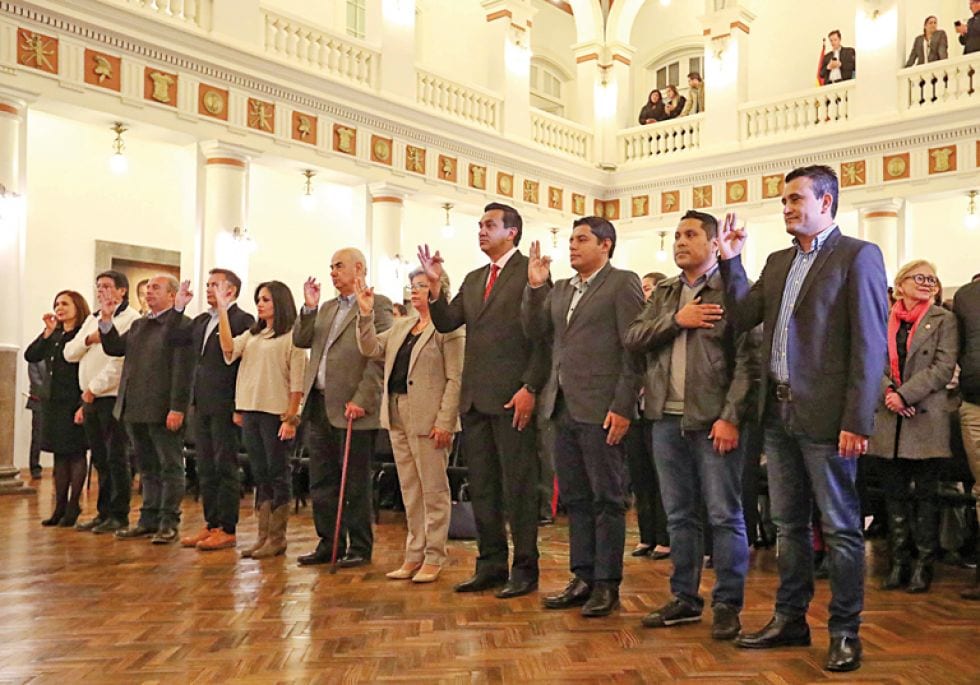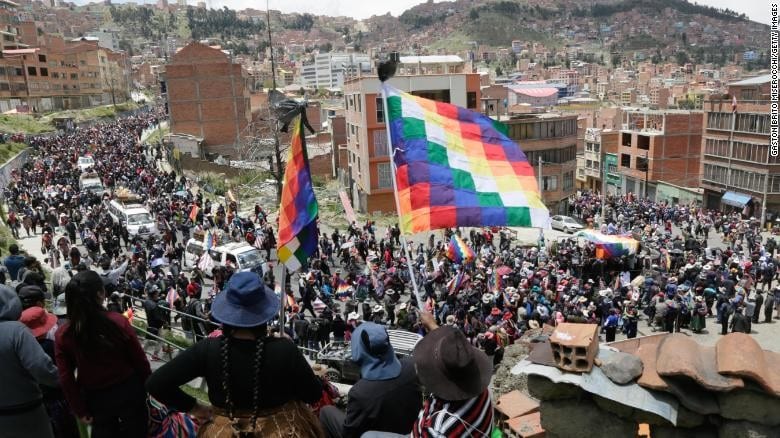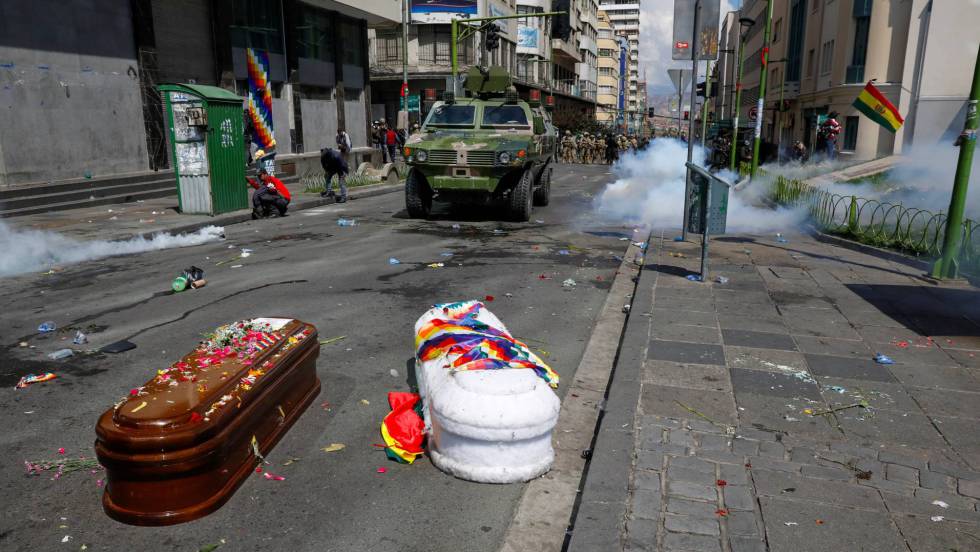In the evening of November 12, in the absence of parliamentary quorum, Jeanine Áñez declared herself the interim president of Bolivia, she appeared on the balcony of the Presidential Palace with a Bible in her hands and announced that “God is returning to the country”, replacing the Indian patroness of Pachamama. What are the first steps taken by the new head of state? What to expect from a transitional government?
Who took the presidency in Bolivia? What do we know about Áñez? Jeanine Áñez Chávez is a Bolivian politician and lawyer. Born August 13, 1967 in the province of San Joaquin, Department of Beni. Jeanine Áñez graduated from high school in 1984, and then continued her studies in law in public and social management. In the 90s. Áñez worked as a TV presenter on the channel “Totalvision”, and was also a member of the National Executive Committee of the Social Democratic Movement. From 2006 to 2008 Jeanine Áñez worked as part of the Constituent Assembly to draft a new Constitutional Charter.
In 2010, Áñez was elected senator to the Plurinational Legislative Assembly of Bolivia from the Progress Plan of Bolivia and National Convergence Party (Spanish – Plan Progreso para Bolivia – Convergencia Nacional), representing the Beni Department. By 2019, she became the second Vice-Speaker of the Senate, representative of the “Unidad Demócrata” in the upper house of the Bolivian Parliament. This position made her the sixth in the line of presidency.
Due to the resignations of the country’s leaders, on November 12, 2019 she proclaimed herself the interim president of Bolivia on the basis of Art. 169 and 170 of the Political Constitution of the country in force since 2009. She stated that her first task would be to achieve a quorum after a series of resignations of the top officials of the state, and then call new elections.

The day after Jeanine Áñez took over the presidency of Bolivia, she began to form a new cabinet. Through the Presidential Decree No. 4077, 10 ministers were initially appointed, among whom there was not a single supporter of the former ruling political platform“Movimiento al Socialismo” (MAS) and most of them had previously been in the ranks of senators and deputies from Agnes’s Party “Unidad Demócrata” in the Plurinational Legislative Assembly of Bolivia. In the following days, the Áñez government replenished with another 10 Ministers. At the time of the oath, each of them strove to emphasize their desire to change Bolivia for the better and “return democracy” to the country.
In the next few days, the first steps of the formed transitional government were not long in coming. On November 14, supporters of Jeanine Áñez tried to remove and burn the flag of the Native Indigenous peoples, which was approved by the Political Constitution of Bolivia – “wiphala”. After the adoption of the Constitution of 2009, the Latin American country not only received a new name – the Plurinational State of Bolivia, but also approved three official flags – the famous tricolor, existing since the foundation of the Republic in 1825, the “rainbow” canvas “wiphala”, the historical distinguishing sign of the Indians Aymara, as well as the flag of the Navy and Marine Corps of Bolivia, which reflects the country’s centuries-old claim to the coast lost during the Second Pacific War with Chile (1879-1882). Under the government of Evo Morales (Spanish – Juan Evo Morales Ayma), all three flags were the national symbols of Bolivia.
After the fight against “wiphala” was announced, the electorate of the party “Movimiento al Socialismo” (MAS): trade union associations, representatives of indigenous Native Indigenous peoples rushed to the political capital of Bolivia, La Paz, threatening to oust Áñez from the Presidential Palace. The formed government “thought better of it” and decided “not to play” with the flag “wiphala” and frustrated feelings of the supporters of the previous ruling regime.
On November 14, the interim president of Bolivia, Jeanine Áñez, announced that the new authorities would recognize Juan Guaidó as the head of Venezuela (Spanish – Juan Gerardo Guaidó Márquez), and not official Caracas – Nicolas Maduro (Spanish – Nicolás Maduro Moros). After such a statement, on November 15, the Foreign Minister Karen Longaric (Spanish – Karen Longaric Rodríguez) announced the country’s withdrawal from the Bolivarian Alliance for the Peoples of Our America (ALBA), and a few hours later on the termination of diplomatic relations with Venezuela. In addition, Longaric officially confirmed that about 80% of the diplomats appointed by the ex-president of the country, Morales, were relieved of their posts, because, according to the head of the diplomatic department, they were not so much diplomats as agents of influence of the former leader.

After the resignation of Evo Morales on November 10 and up to November 25, Bolivia, especially its political capital, La Paz, “plunged” into large-scale strikes. Thousands of activists opposed the newly formed government, demanded the resignation of Áñez, and also tried to draw international attention to respect for their votes cast in the general election on October 20. The strikers blocked the roads leading to La Paz, which these days led to interruptions in the supply of food and fuel to the city.
Jeanine Áñez decided to react to the unrest that had begun with a very radical measure. On November 17, the interim president of Bolivia issued a decree exempting the armed forces from criminal liability when restoring order. In the following days, such a decision was condemned by international organizations and political opponents. Former President Evo Morales, while in Mexico, warned the army that international standards were above the decree of the interim government.
In response to this Presidential Decree, the degree of social tension instantly increased. November 19, in clashes with the police and the military at the “Senkata” refinery plant in El Alto, which supplies the capital, according to official figures, 10 people died. According to Bolivian media reports, after sending a convoy of fuel to La Paz, protesters tried to regain control of the refinery of the state-owned petroleum company “YPFB”. Using dynamite, they blew up the wall of the enterprise, after which the police at the oil product warehouse opened fire.

Two weeks after the entry into force of a very controversial presidential decree, amid social convulsions, daily clashes between protesters and the police, about 30 dead and more than 700 wounded, Jeanine Áñez decided to cancel this measure, and on November 24, the interim head of state signed the long-awaited new general elections law. The maximum term for holding new presidential elections in Bolivia will be 140 days after the signing of the document by the president, Jeanine Áñez – the deputies took an extra 20 days to the elections of the Supreme Collegium of the High Electoral Court. Elections must be held no later than April.
In turn, on November 22, with the assistance of the Personal Envoy of the UN Secretary-General, an Agreement was signed between the transitional government, the party “MAS”, and the Episcopal Conference of Bolivia on overcoming the current crisis. The main appeal of this document was the holding of fair, transparent and free general elections with the participation of international observers.
After signing the Agreement on dialogue between the transitional government and supporters of the party “Movimiento al Socialismo”, as well as the presidential decree on the adoption of the general electoral procedure, Bolivia is gradually returning to its former life. However, a number of political observers believe that this is only a “peaceful pause” before continuing the political struggle, because supporters of the party of ex-president Morales do not intend to give up and have already announced that they will participate in the elections and present a worthy candidate.


